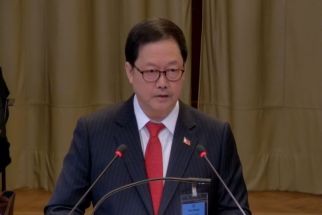Philippines lauded for reforms to exit FATF gray list
MANILA, Philippines — A United Nations official yesterday said the Philippines is achieving a “significant milestone” on the international stage because of reforms it undertook to exit the gray list, as required by dirty money watchdog Financial Action Task Force (FATF).
During the fifth state conference on the UN Convention Against Corruption implementation and review at Malacañang, UN Office on Drugs and Crime country manager Daniele Marchesi lauded the country’s efforts on financial reforms.
“All 18 action items required by the Financial Action Task Force, FATF, to exit the gray list of jurisdictions under increased monitoring for the anti-money laundering and counter-financing of terrorism have been addressed,” the UN official said.
“At its October 2024 plenary, the FATF recognized this progress and announced that an on-site assessment would be conducted to confirm the sustainability of these reforms,” he added.
Marchesi said successfully exiting the gray list would enhance the Philippines’ reputation in the international financial community and open doors for greater investment and economic opportunities.
The gray list contains jurisdictions that are actively working with the FATF to fix strategic deficiencies and to counter money laundering, terrorist financing and proliferation financing.
When a jurisdiction is under increased monitoring, it means the country has committed to swiftly address the identified strategic deficiencies within agreed timeframes.
There are 24 countries in the Paris-based watchdog’s gray list, including the Philippines.
In a prepared speech delivered during the event, Marcos acknowledged that the gaps in implementation, evolving political climates and systemic vulnerabilities serve as a reminder that the war against corruption is far from over.
“We are called to go beyond implementing policies and protocols and to look deep into our core values to strengthen the culture of integrity. We must shift away from merely enforcing compliance with laws, rules and regulations, to steering our people towards the practice of integrity in their daily lives,” the President said.
“We all know that lofty ideals will not suffice. People expect results. And results demand action. To build a government founded on integrity and accountability, we must adopt comprehensive and interconnected strategies,” he added.
Anti-corruption laws
Marchesi also called for the passage of laws that would boost the country’s drive against corruption. He stressed there are critical areas in the anti-corruption campaign that require sustained focus.
According to Marchesi, the enactment of a comprehensive whistleblower protection law is an “urgent priority.”
“Whistleblowers play a pivotal role in exposing corruption, but they must be shielded from retaliation. A national law would create uniform safeguards, empowering individuals to report wrongdoing and strengthening accountability,” the UN official said.
Marchesi also pushed for the development of a beneficial ownership transparency law, saying it would prevent the misuse of corporate structures to conceal illicit financial flows.
The UN official called for the expansion of the freedom of information framework to include the legislative and judicial branches. The Philippines has an FOI policy but it only covers the executive branch.
“Extending freedom of information coverage will boost transparency and accountability, empowering citizens and strengthening public trust in democratic institutions,” Marchesi said.
He likewise urged the Philippine government to continue addressing the risks posed by Philippine offshore gaming operations or POGOs and related activities.
According to him, President Marcos’ “decisive” issuance of Executive Order No. 74 to ban POGOs is an “impressive step.”
“Effective enforcement will require enhanced interagency coordination, oversight and resources,” he added.
Marchesi said continuing to promote integrity, accountability and human rights in law enforcement and the criminal justice system is also a key priority.
“Ultimately, defeating corruption is not only about policies and laws. It requires systemic, incremental changes that reshape institutions and behaviors over time. Education is key to achieving these cultural shifts,” he said.
“Education for integrity, particularly among young people and newly appointed public officials, is an essential ingredient to prevent corruption,” he added.
- Latest
- Trending
































